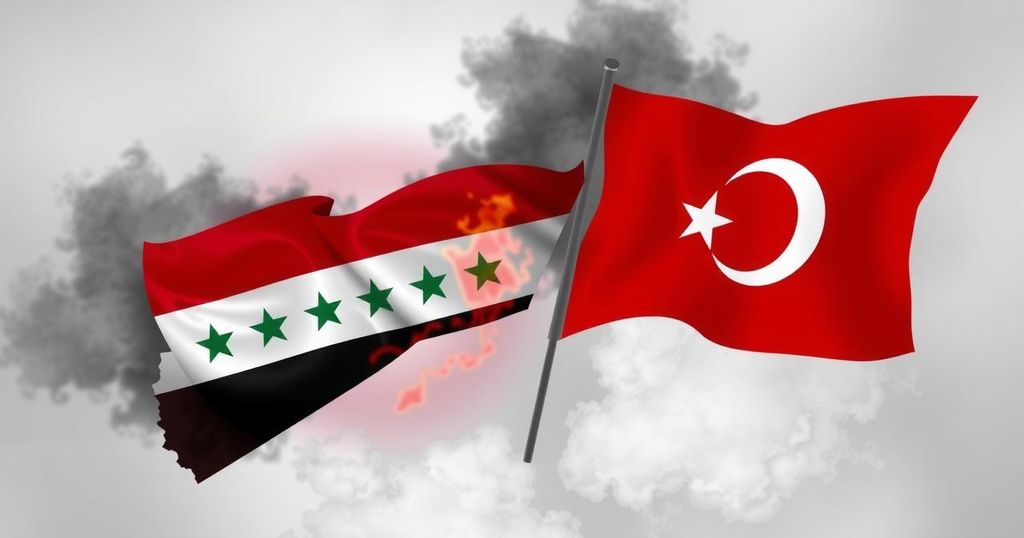Global news
AMERICA, ASIA, CONFLICT, DEMOCRATIC FORCES, EUPHRATES, EUPHRATES RIVER, FIGHTER JETS, IRAQ, ISIS, ISLAMIC STATE, LARA JAKES, MANBIJ, MATTHEW MILLER, MILITARY ACTIONS, MILITARY OPERATIONS, MILLER, NATIONAL ARMY, NORTH AMERICA, REFUGEE CRISIS, STATE DEPARTMENT, SYRIA, TRUMP, U. S, UNITED STATES, WASHINGTON
Jamal Walker
0 Comments
Cease-Fire Extended in Manbij as U.S. Officials Seek Lasting Peace in Northern Syria
A cease-fire in Manbij, Syria, has been extended as U.S. officials negotiate a lasting peace between Kurdish and Turkish-backed fighters. The truce aims to reduce hostilities in a city that has been a focal point in the civil war and previously controlled by ISIS. Key Kurdish military figures propose a demilitarized zone to ease tensions, but future U.S. military involvement remains uncertain.
A recent cease-fire in Manbij, a strategically significant city in northern Syria, has been extended as U.S. and foreign officials strive for a lasting truce between rival Kurdish and Turkish-backed forces. State Department spokesperson Matthew Miller announced that the cessation of hostilities, initiated last week, would continue until the end of the week, although no specifics regarding a potential further extension were provided. He emphasized the importance of reducing conflict in Syria and working towards de-escalation.
Manbij, an Arab-majority city approximately 20 miles from the Turkish border, has historically been a contentious point during the Syrian civil war. The Islamic State seized control of Manbij in 2014 but was liberated by the Kurdish-led Syrian Democratic Forces (SDF) in 2016, with American support. As the city became a focal point for warring factions, a cease-fire agreement was reached last week, mandating Kurdish forces to pull back not only from Manbij but also to retreat to the east of the Euphrates River, in accordance with a prior 2019 agreement.
The Kurdish forces have remained a crucial ally for the United States in the ongoing conflict against the Islamic State, capturing many territories and detaining numerous fighters. However, Turkey perceives the Kurdish forces as a significant threat, associating them with the Kurdistan Workers’ Party (P.K.K.), a group Turkey considers terrorist. The withdrawal of Kurdish fighters from Manbij is viewed as a step towards alleviating tensions with Turkish-backed forces, who have recently engaged in confrontations with the Kurds, particularly around Kobani—a city of substantial symbolic importance to Kurdish fighters after its liberation from ISIS.
In a response to the current situation, General Mazloum Abdi, the Kurdish military commander, proposed a demilitarized zone in Kobani under American oversight aimed at addressing Turkey’s security concerns and maintaining regional stability. Nevertheless, it remains uncertain whether President-elect Donald J. Trump will support this initiative, especially considering his past inclination to reduce American military presence in Syria.
The extended cease-fire in Manbij reflects ongoing diplomatic efforts to stabilize a region marked by conflict between various factions since the Syrian Civil War began. The Kurdish forces, notably the SDF, have played a vital role in combating the Islamic State and remain a key U.S. ally. Meanwhile, Turkey’s longstanding opposition to the Kurdish groups due to perceived links to separatist movements complicates the situation further. Previous agreements, particularly those brokered under the Trump administration, delineated specific territorial lines, such as those near the Euphrates River, which continue to impact military and political strategies in the area.
The extended cease-fire in Manbij underscores the fragile dynamics of conflict in northern Syria, highlighting the intricate web of alliances and hostilities. The U.S. administration’s attempts to mediate between Kurdish and Turkish-backed forces illustrate the complexities of regional security, particularly in light of Turkey’s concerns over Kurdish militancy. Future negotiations and potential military arrangements will be critical in determining the stability of the region.
Original Source: www.nytimes.com




Post Comment